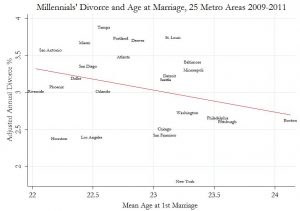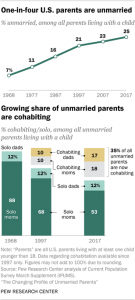Divorce Rates And Why Living Together Could Increase Chances Of Ending Up In Family Court

According to the U.S. Centers for Disease Control and Prevention 1, divorce rates in New Jersey are among the lowest nationwide. With the exception of people over the age of 50, who are getting divorced more often than younger couples, divorce rates in New Jersey have continued to drop over the last five years. 2 Overall, statistics reveal that divorce rates have declined over the past 10 years or so, but still almost 40% of all marriages end in divorce.

Why Divorce Rates Are On The Decline
Cohabitation without getting married and the rate of births between non-married people is on the rise. According to a study by Gallup, only 16% of 18 to 29-year-olds were married. 64% of that age group remained single.4 Studies cite a number of reasons for this including people waiting longer to marry, and a decline in the rate of marriages.
According to a recent study on divorce rates by Philip N. Cohen of the University of Maryland, millennials wait longer to get married, and are more established and stable when they do, leading to fewer divorce risks.
The following chart illustrates how divorce rates gradually decline for millennial’s who wait longer to get married. 5
The Pew Research Center reports that the number of cohabiting partners has increased 29% since 2007. The Pew Research Center last year found that one-in-four parents living with a child in the United States today are unmarried (25%), marking a dramatic change from a half-century ago, when fewer than one-in-ten parents living with their children were unmarried (7%).6
Why More People Are Waiting To Get Married Or Not Marrying At All
While many young adults cite economic reasons for not getting hitched, another reason seems to be a reflection of new and evolving attitudes regarding traditional marriage. Many young people say their hesitation has more to do with holding onto their freedom and a desire to avoid the complications of traditional marriage. They want to keep their options open.

The Unexpected Risks Of Living Together
Those who choose cohabitation versus getting married, because they want to avoid the complications of marriage, may find that the grass isn’t always greener on the “living together” side of the fence.
Family law disputes and divorce are a fact of life and touch virtually every human being in some way. In fact, it can be argued that people who live together are at a greater risk of facing family law litigation.
The University of Maryland study by Philip N. Cohen found that waiting to get married could lead to fewer divorce risks, but what about those who live together before getting married or those who live together and never get married?
Studies have found that “living together” or cohabitation relationships tend to be less stable and more often end a breakup than marriage.7 And that’s really not surprising.
What is surprising is the data which indicates an increased chance of divorce when couples cohabit before getting married.
Research conducted by the Institute For Family Studies indicates that those who do live together prior to getting married are actually at a higher risk of divorce than those who did not cohabit. 8 This is explained by what is referred to as the inertia of cohabitation.
According to Dr. Scott Stanley,
“This idea of inertia is based on the fact that many people increase their constraints for staying in a relationship before they have clarified a mutual dedication to being in the relationship.” 9
The premise is that when people are sharing an address they get caught up in an inertia that makes it harder to break up. This inertia increases the likelihood they will get married to someone they might not have married had they not been living together.
Family Law Complications Faced By Cohabiting Couples Who Break-Up
One of the major problems with “uncoupling” when a couple is not married is the lack of applicable laws in New Jersey to address the various issues which are otherwise applicable to divorcing couples. New Jersey common-law marriage was abolished by statute in 1939. Without common-law marriage in New Jersey, it’s not always clear what rights unmarried couples have when they have been living together for an extended period of time.
Considering the increasing number of people who are cohabiting without getting married, the New Jersey courts do recognize that in certain situations an unmarried person may have the right to financial support from a partner after the relationship has ended.
Palimony is financial support that an unmarried person can request from their partner after separating. For a palimony claim to be enforceable, a cohabitation agreement must exit between the parties. The cohabitation or palimony agreement, must be in writing, must be signed by the party promising to provide financial support, and both parties must have received advice from separate divorce attorneys before entering into the agreement.
Married couples and those who cohabit (live together) face issues like custody, parenting time, support issues, distribution of property, tax issues, insurance issues, and more every day.
The traditional litigation method of addressing these divorce and family law issues is expensive, ineffective, outdated, and not healthy for the participants; and sometimes there is not an adequate law to address a particular issue.
The Good News

The good news is that there are viable alternatives such as mediation and collaborative law/divorce available to couples. I have 30 years of experience in divorce and family law and have witnessed the damage the traditional litigation approach has had on families and children. My practice is now focused on using alternative dispute resolution methods such as mediation and collaborative law to help clients maintain better relationships in divorce or after a family law dispute, find creative and workable solutions to their issues, and create a more peaceful life for themselves and their children.
Notes
1. https://www.cdc.gov/nchs/data/dvs/state-divorce-rates-90-95-99-17.pdf
2. https://nypost.com/2016/11/19/new-jersey-has-fourth-lowest-divorce-rate-in-us/
3. https://www.huffpost.com/entry/why-arent-millennials-getting-married_b_5a075620e4b0ee8ec3694209
4. https://www.popcenter.umd.edu/news/news_1415806591504
5. https://familyinequality.wordpress.com/2014/11/06/top-25-cities-for-millennial-divorce/
7. https://ifstudies.org/blog/is-living-together-all-its-cracked-up-to-be/
8. https://ifstudies.org/blog/the-complex-risks-associated-with-cohabitation
9. https://www.psychologytoday.com/us/blog/sliding-vs-deciding/201407/the-hidden-risk-cohabitation







